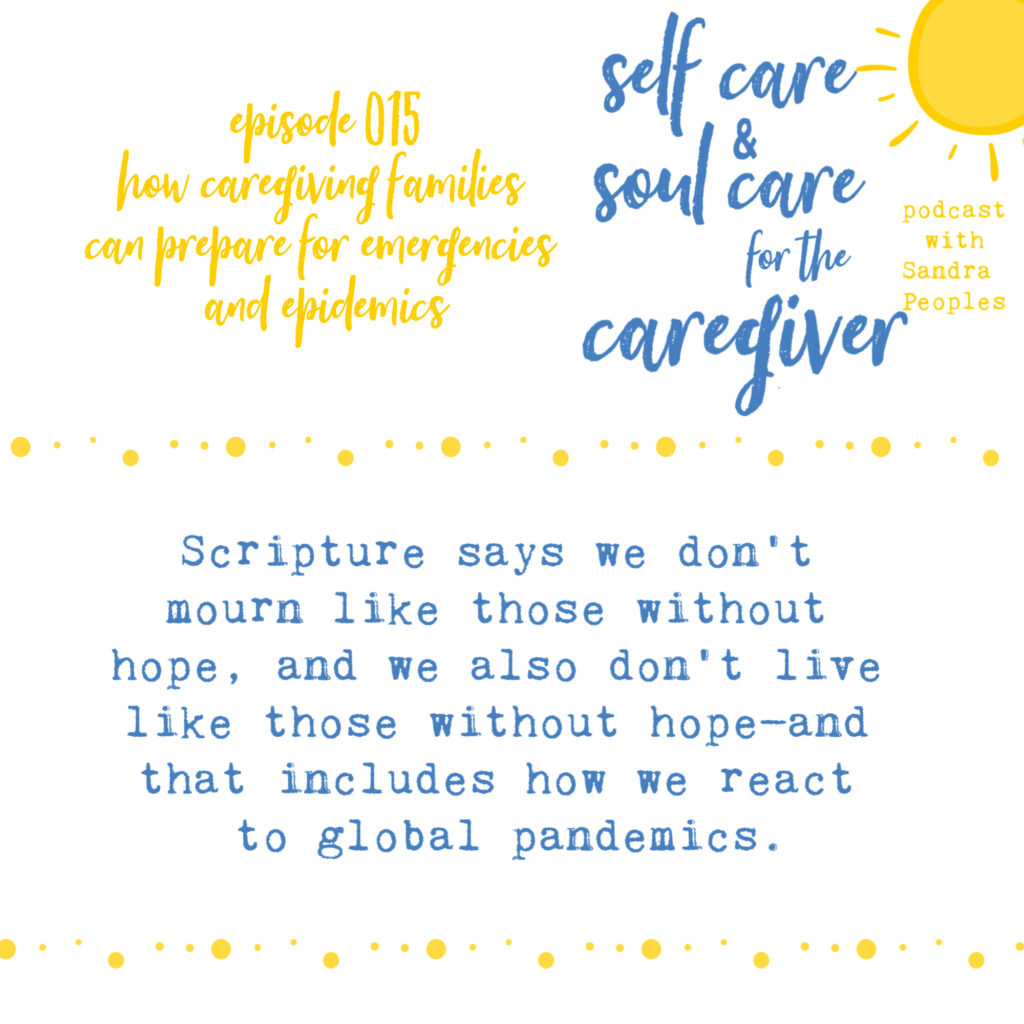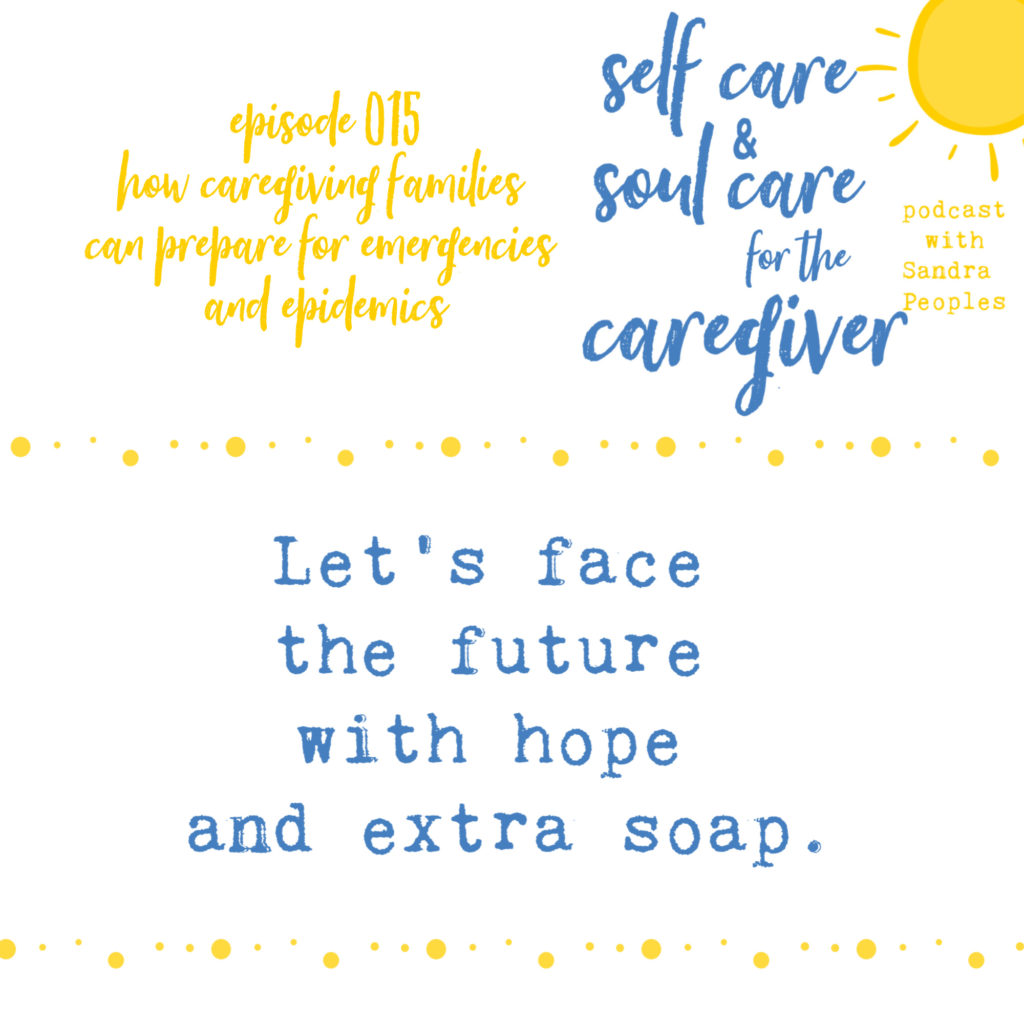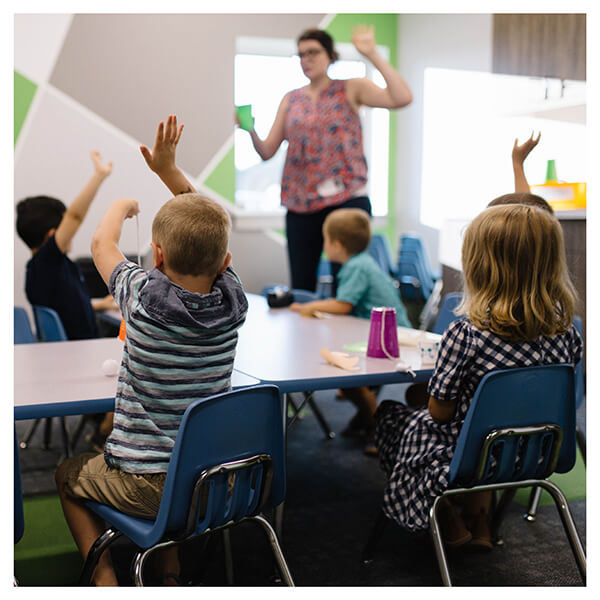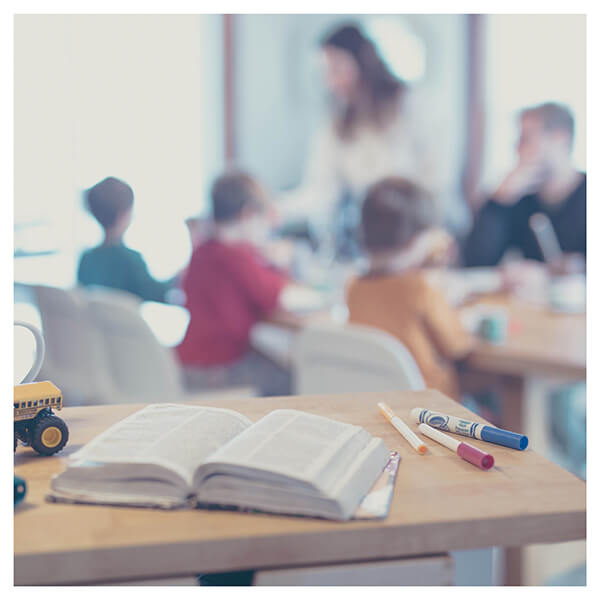Today we’re taking a few minutes to talk about how caregiving families can prepare for emergencies and epidemics. I’m going to draw on our experience with Hurricane Harvey a couple years ago and the lessons I learned then that I still apply today. And like in the aftermath of Harvey, I’m praying this worldwide epidemic is an opportunity to protect our families, love our neighbors, and to remember our trust in God’s plan.
Scripture says we don’t mourn like those without hope, and we also don’t live like those without hope, and that includes how we react to global pandemics.
Listen to Self Care and Soul Care for the Caregiver on iTunes or the link at the end of the show notes.

Quick links from the episode:
- Episode 11 on menu planning
- Episode 12 on solutions for extra stressful seasons
- A Check List for Caregiving Families Preparing for the Coronavirus
- 100 Ideas for Keeping Your Child with Special Needs Busy All Summer

Transcript:
This is self-care and soul care for the caregiver, and I’m your host—Sandra Peoples. To us, self-care isn’t a luxury, it’s a necessity. We want to take better care of ourselves so we’re able to care for our loved ones who rely on us.
Friends, I wasn’t planning to release an episode this week because we were on spring break and I traveled with my parents and big sister to a family funeral in Oklahoma. But I think it’s important we address the corona virus and how families like ours should prepare. If you have a medically fragile family member, we can all learn a lot from you during a time like this! You are pros at what so many people are learning more about right now, from how to properly wash your hands to tips during times of social isolation.
This affects me not only as a special-needs mom, but also as a pastor’s wife and disability ministry leader. It’s part of my husband’s job to keep our entire church safe and it’s part of my job to keep the kids in our classes safe. And honestly, what’ safe for my classes may be more extreme than what’s safe for the entire church.
So let’s talk today about How Caregiving Families Can Prepare for Emergencies and Epidemics. I’m going to draw on our experience with Hurricane Harvey a couple years ago and the lessons I learned then that I still apply today. And like in the aftermath of Harvey, I’m praying this worldwide epidemic is an opportunity to protect our families, love our neighbors, and to remember our trust in God’s plan.
When we heard Hurricane Harvey was headed our way, we weren’t fully sure how to prepare. I grew up in Oklahoma where of course we don’t worry about hurricanes, and Lee grew up in North Carolina, but not as close to the coast as we live now. We stocked up on the essentials and extra food, but we didn’t plan for long enough and ended up eating some pretty strange combinations. Especially since delivery trucks couldn’t get to our grocery stores with the roads flooded. Mail delivery was also affected. We learned then to switch to online bill pay so future mail disruptions wouldn’t be too much of a hassle. We also now make sure the cars had more than a half tank of gas in case we needed to evacuate during hurricane season. If you’re preparing your family for tornado or hurricane season, I hope those lessons we learned can help you!
But of course what we’re all talking about right now is the coronavirus. The steps we can take to prepare for it are a little different. Let’s go through five of them together. If you haven’t taken these steps yet, now is a great time to do so:
- Make sure you have the medicines you need, enough to keep you from having to stand in line at the pharmacy with people who may be infected in the coming weeks. Make sure you also have supplements your family takes. We keep elderberry, vitamin C, and melatonin on hand, so I made sure we had it all. If you haven’t taken this step yet, put it at the top of your to do list.
- Food – Many of our family members have food allergies or aversions. Feeding them can be a little more difficult. If you listened to episode 11 on menu planning, you should have an idea of the meals your family likes and a plan for rotating through them. Rely on the rhythms and routines that already work for you, like we talked about in episode 12 on solutions for extra stressful seasons! This is also a good time to double recipes and freeze the leftover in case you get sick and still need to feed your family without relying on drive thrus. There are certain snacks James likes that we can buy extra of so we don’t run out if the schools close for an extended time. And don’t forget what you may need to get through the long days together, like extra coffee.
- Other supplies – I know there are jokes about buying too much toilet paper, but if you plan to limit your social interaction including going to stores, you’ll need extra toilet paper. You may also want to get laundry detergent, especially if you do a lot of laundry like we do! I also cleaned out our medicine cabinet to get rid of anything that had expired and to make sure I had the basics like bandaids, rubbing alcohol, and a pain reliever/fever reducer. I also got chicken noodle soup, saltine crackers, pedilyte and Gatorade in case anyone comes down with a stomach bug. Some of us may life in areas where cases will be as prevalent as they are in parts of Italy, and we know their hospitals are at 200% capacity. Getting what we need now to avoid places where sick people may be will be helpful!
- Entertainment and sensory activities – just coming off of spring break, I was reminded how hard it is for James to be at home all day without some structure and extra activities. We have an indoor ballpit, a mini trampoline, and I got new puzzles and books. I have a list of 100 activities for kids with special needs to stay busy in the summertime, but many of them would work now! I’ll link to them in the shownotes.
- Make a plan for levels of social isolation. Are there activities you can limit now? Our church doesn’t plan to close but is reminding people to stay home if they are more comfortable doing so. I assume many of the special-needs families we serve will choose to stay home. When we do get out, we’re washing our hands often, making sure we limit exposure (like not setting our cell phones down in public bathrooms), and cleaning the steering wheel and other surfaces in our cars. We can really learn from the steps our friends who are medically fragile already take during cold and flu season!
These 5 steps are the best ways for caregiving families to prepare for emergencies and epidemics. As we prepare, we don’t need to give into worry or fear. Scripture says we don’t mourn like those without hope, and we also don’t live like those without hope, and that includes how we react to global pandemics.

Let’s end in prayer like we do for every episode. God, You are sovereign over all things and even when the news preys on our fear, we can trust in You. Help us to be wise in the decisions we’re making to keep our families healthy and safe. And help us to also remember to love those You put in our paths. As followers of Christ, we can be a light in this dark time! It’s in his name we pray, amen.
Friends, let’s face the future with hope and extra soap. Be kind to each other (online and in person) and make decisions that are best for your family and your neighbor. We don’t have to give into fear, but we can lower our risks and the risk to those we love by taking extra precautions. As a bonus, I’ve created a downloadable check list you can print off to help you prepare. Just head to sandrapeoples.com/thepodcast and look for the link to episode 15.

Thanks for joining me for this quick episode. If you’re listening for the first time, you can visit sandrapeoples.com/thepodcast to check out previous episodes on topics like eliminating decision fatigue and establishing habit triggers. I’ll meet you back here next week for more encouragement to care for yourself as you care for your loved one.



